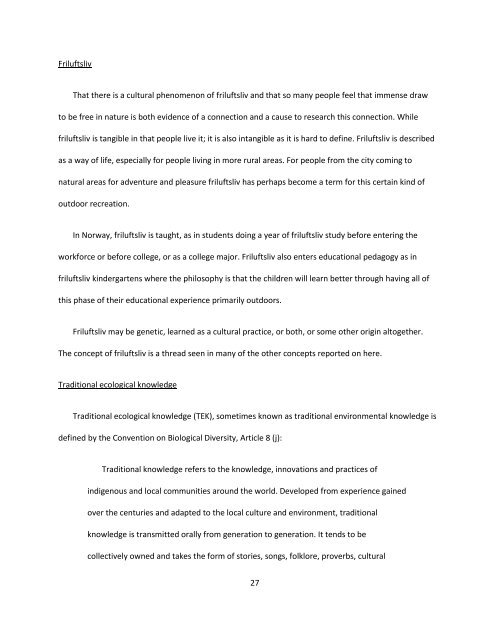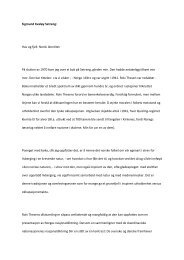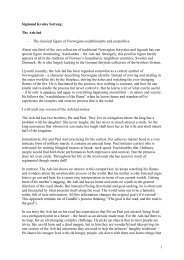The Healing Power of Nature - Norwegian Journal of Friluftsliv
The Healing Power of Nature - Norwegian Journal of Friluftsliv
The Healing Power of Nature - Norwegian Journal of Friluftsliv
Create successful ePaper yourself
Turn your PDF publications into a flip-book with our unique Google optimized e-Paper software.
<strong>Friluftsliv</strong><br />
That there is a cultural phenomenon <strong>of</strong> friluftsliv and that so many people feel that immense draw<br />
to be free in nature is both evidence <strong>of</strong> a connection and a cause to research this connection. While<br />
friluftsliv is tangible in that people live it; it is also intangible as it is hard to define. <strong>Friluftsliv</strong> is described<br />
as a way <strong>of</strong> life, especially for people living in more rural areas. For people from the city coming to<br />
natural areas for adventure and pleasure friluftsliv has perhaps become a term for this certain kind <strong>of</strong><br />
outdoor recreation.<br />
In Norway, friluftsliv is taught, as in students doing a year <strong>of</strong> friluftsliv study before entering the<br />
workforce or before college, or as a college major. <strong>Friluftsliv</strong> also enters educational pedagogy as in<br />
friluftsliv kindergartens where the philosophy is that the children will learn better through having all <strong>of</strong><br />
this phase <strong>of</strong> their educational experience primarily outdoors.<br />
<strong>Friluftsliv</strong> may be genetic, learned as a cultural practice, or both, or some other origin altogether.<br />
<strong>The</strong> concept <strong>of</strong> friluftsliv is a thread seen in many <strong>of</strong> the other concepts reported on here.<br />
Traditional ecological knowledge<br />
Traditional ecological knowledge (TEK), sometimes known as traditional environmental knowledge is<br />
defined by the Convention on Biological Diversity, Article 8 (j):<br />
Traditional knowledge refers to the knowledge, innovations and practices <strong>of</strong><br />
indigenous and local communities around the world. Developed from experience gained<br />
over the centuries and adapted to the local culture and environment, traditional<br />
knowledge is transmitted orally from generation to generation. It tends to be<br />
collectively owned and takes the form <strong>of</strong> stories, songs, folklore, proverbs, cultural<br />
27




